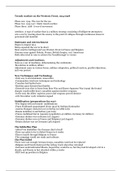Trench warfare on the Western Front, 1914-1918
Phase one: 1914- The race for the sea
Phase two: 1915-1917- Static trench warfare
Phase three: 1918- A war of movement
Attrition- A type of warfare that is a military strategy consisting of belligerent attempts to
win a war by wearing down the enemy to the point of collapse through continuous losses in
personnel and material.
Stalemate and entrenchment
Began in August 1914
Many expected the war to be short
Most emotive battleground was Western Front in France and Belgium
German army against Britain, France, British Empire, 1917 Americans
Both sides tried in vain to achieve the ‘breakthrough’ to victory
Adjustment and reactions
Seen as a war of machines, dehumanising the combatants
’Revolution in military affairs’
Adjustment came in various forms, military adaptation, political reaction, pacifist objections,
anti-war protest
New Techniques and Technology
-Only way to end stalemate- innovation
-Commanders tried new techniques and technology
-Trenches had barbed wire
-Machine guns dictated land battles
-Generals were slow to learn from Boer War and Russo-Japanese War (1905) the frontal
charges would suffer heavy casualties against modern weapons.
-In the end, the Allies’ superior power and weapons proved decisive
-11th November 1918, Armistice signed
Mobilisation (preparations for war)
-War begins with movement- mobilisations
-Franz Ferdinand assassinated (June 1914) by Serbian Nationalist
-Austria-Hungary declared war on Serbia on (28th July)
-Russia mobilizes to aid Serbia-(31st July)
-France mobilised fast in response (population 40 million, Germany 60 million)
-Germany declare war on Russia (1st August)
-Germany declare war on France and Belgium (3rd August)
-Britain declare war on Germany (4th August)
The Schlieffen Plan
-Alfred Von Schlieffen- the German chief of staff
-Drew up a plan to try to defeat France in 6 weeks
-Plan to march through Belgium to France
-The campaign would use roads and railways
The Plan failed
There were not enough German troops, casualties could not be replaced
-Belgians and French destroyed the railway track when they retreated
-Germans underestimated Russia, hoped they would be so, but they had developed a lot in a
decade, and Russia in fact attacked within 3 weeks
-BEF took up position in Belgium





